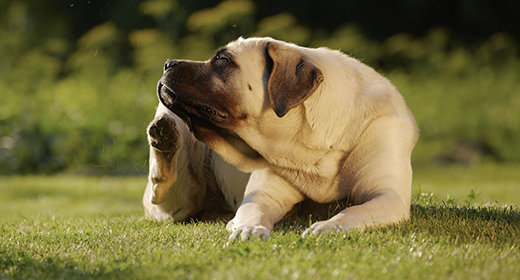

Is your dog always scratching, chewing, itching, or licking itself? Nibbling on its paws like they've been smeared with peanut butter? Although it may appear adorable at first, these are all indications that your dog is allergic.
Dog allergies are very common, and they are one of the primary causes of veterinary visits. Usually, their skin and ears are the most affected areas. Just as they are for humans, environmental and seasonal allergies can cause some discomfort and be an issue for dogs. While allergies in people tend to improve, allergies in dogs often worsen with age.
But how can you tell whether your dog is allergic to something and what's causing it? Unfortunately, correctly diagnosing these symptoms as dog allergies is not really simple. Your dog can't tell you what's wrong. So, it's up to you, the pet parent, to spot the signs.
The human animal isn’t the only one affected by allergies. Like you, your adult dog can suffer from allergic reactions to any number of things—in the air, on his skin, and in his food. Allergies must be diagnosed and treated by your veterinarian, but first, you must know what to look for. Therefore, to relieve your furball from all the discomfort caused by allergies, here are some dog allergy symptoms you should watch out for:
Dogs are prone to multiple types of allergies, and each requires a unique treatment. Hence, learning about them will help you identify and manage them.
Environmental allergens such as mould, dust, and pollen can cause severe allergies in dogs, also known as atopic dermatitis. They are triggered by elements found in your home or backyard, or wherever else your dog spends time. Dogs either ingest these allergens like pollen, or they get absorbed into their skin when they come into contact with them. Its ears and paws are the most affected regions; however, it can also affect the muzzle, wrists, ankles, eyes, underarms, crotch, and in between the toes.
An allergic reaction caused by flea bites is one of the most common dog allergies. Plus, flea saliva is also thought to be an allergen in dogs, causing extreme itching. Your dog's skin may become inflamed, red, and scabbed as a result of this, especially near the base of the tail.
Itchy skin in dogs is caused by sensitivities and food allergies. Allergenic protein sources such as beef (34%), dairy products (17%), and chicken (15%) can cause severe food allergies. However, dogs tend to develop a food allergy at any time in their lives, regardless of whether they had previously consumed any type of food from any brands.
Inhalant allergies in dogs are caused by the same common allergens that affect you—dust, grass, trees, mould, pollen, ragweed, etc. They can be seasonal or persistent and, while some breeds (especially short-snouted breeds) might experience the same sniffly, sneezy symptoms you might suffer, skin reactions are most common. Inhalant allergies often can be treated with the same medications you take, but please don’t treat your dog’s allergies without veterinary supervision.
Allergies can vary from dog to dog, so it is important that you work with your vet to make sure your dog gets the best possible treatment. You’ll both be happier for it.
Now that you know the types of dog allergies, it’s time to understand the most common allergic reactions in them.
Excessive itching affects the majority of dogs at some stage in their life. A dog with pruritus will bite, scratch, or lick its skin excessively. Itching is referred to as pruritus in medical terms and is one of the most common dog allergy symptoms. It is also a primary factor why dog owners seek veterinarian care.
If your dog licks its skin frequently or incessantly, especially its feet, it's a sign of allergies. The condition could be caused by irritants present in your home or while you go out for walks with your dog. However, it could also be a sign of your furball’s food allergies.
Feet chewing is another prevalent dog allergic reaction. Your dog chews its feet because of an allergy to grass or other environmental pollutants like pollen or dust mites. Inflammation and irritation occur when an allergen comes in touch with its skin. As a result, the skin in the affected area becomes unbearable, and the dog begins to gnaw.
Your dog may have an allergy if you observe it itching a lot or if you notice redness on its skin. These allergic reactions are common in all sorts of dog allergies. If they are the only symptoms you're observing in your dog, you can wait a day or two before making an appointment with your vet.
It can take a little practice to figure out different ways to help alleviate your dog's allergy issues. One effective method is to frequently bathe your dog with hypoallergenic shampoos. This will help remove allergens such as grass or pollen from your dog's body.
Flea control is also necessary to reduce allergy symptoms in a flea-allergic dog. Fleas must be inevitably treated in a dog's environment as well. Vacuum properly to eliminate the eggs and larvae, then discard the vacuum bag. Insecticides can be used both inside and outside your home to keep fleas at bay. In addition to that, hypoallergenic diets make for great dog allergy remedies. These diets contain fewer ingredients with a unique protein source, or they are processed in a specific way to reduce allergic reactions. Consult your vet for advice on the best diet for your pet. But remember that during the trial period, flavoured drugs, treats, and human meals must be avoided.
Did you know? Certain dog breeds are more prone to allergic reactions. Yes. Hence, if you have one of these breeds, you must be extremely careful with it.
The English Bulldog is a short-haired breed that sheds moderately. Although it sheds hair all year, that isn’t the only allergy issue. These dogs drool a lot, and as the saliva dries and releases proteins into the air, it might induce an allergic reaction.
An activated immune system in American bulldogs can cause allergies. If your dog has signs like itchy skin, redness, or licking its paws, you know that your dog is allergic.
The most prevalent dog allergies in Bichon Frises are contact allergies that develop skin problems as well as food allergies. They are also allergic to flea bites and allergens in the air, such as flowers, grass, dust, and trees.
These dogs are also susceptible to contact allergies. They are allergic reactions to objects they come into contact with, including houseplants, cleaning detergents, and even some dog shampoos. Symptoms are more likely to be seen on the skin, so look for redness, flakiness, or a rash in the paws, belly folds, and ears.
Keep an eye out for food allergies and environmental sensitivities that damage their skin. Boxers are especially sensitive to dog food that contains a lot of grains, such as wheat or corn. Allergies from pollen, trees, dust, and weeds can affect them at any time of year.
Like humans, dogs too have an allergic reaction to certain substances, ranging from food to environmental allergens. Let’s explore a few in brief:
Mould spores are everywhere around us. When inhaled by your dog, it can cause laboured breathing, wheezing, and even coughing. Dog allergies are also triggered by eating or living in a mouldy home. Excessive chewing, scratching, and dry or scaly skin are some of its common symptoms.
When your dog's oil glands overproduce an oil called sebum, dandruff develops. This oil helps moisturise your adorable pup's skin and adds to its overall wellness. But, when the sebaceous glands generate too much oil, an imbalance occurs, resulting in pet dander.
When fleas feed on your dog, they inject their saliva into your dog’s skin. This saliva can cause an inflammatory reaction in your dog, causing it to excessively itch its skin.
Dust mite allergies are caused by small spider-like insects that reside in houses and consume skin dander.
Unfortunately, dog allergies are incurable and unavoidable. However, you can do things to help them manage their symptoms and suffering. To begin, you must first determine the root reason, which could be flea-related, seasonal, food-related, or something else entirely. Then, you can help your dog avoid these allergies. Keep an eye out for itches and treat them immediately to avoid irritated, infected skin and ears.
If your furry friend exhibits any allergic symptoms, rush it to a veterinarian. Though most allergies are not life threatening, they can cause a lot of irritation, discomfort, and even pain to dogs. Moreover, if left untreated, such reactions can even develop into severe health issues. So, make sure you take your pooch to a vet immediately.
You can protect your dog from allergies by avoiding the allergens. Or else, you should regularly clean the air and other surfaces in your home. Additionally, bathing your dog with medicated shampoos for dogs with allergies can help alleviate the symptoms.
The most common dog allergies are:
Note: Seasonal allergies usually occur at a specific time of year, usually in the spring or fall.
Dog allergy remedies can be quite beneficial for their skin. Some of them include:
Allergies in dogs are almost always incurable. However, with the help of your veterinarian and a little patience, you can come up with a treatment and management plan that will keep your dog healthy and symptom-free.



Worried that your small-breed dog is packing on the pounds? Run your hands along his backbone. You should be able to feel (but not see) his ribs. You also should see a clearly defined waist behind the ribs. If you can’t, follow these seven tips from Debra Eldredge, a veterinarian and co-author of “Dog Owner's Home Veterinary Handbook,” published by Howell Book House.
Before you put your overweight dog on a diet, schedule an appointment with the vet to make sure an underlying health problem isn’t causing the numbers on the scale to creep up.
Snacks and table scraps might account for your overweight dog’s bulging belly, Eldredge says. If curtailing in-between meals doesn’t make a difference, consider continuing with the same amount of food but switching to a different formula. Your vet can give you guidance.
Thawed frozen green beans, canned pumpkin (which is fiber-rich and filling) and cut-up carrots make satisfying, low-calorie snacks for your pet.
Apart from veggies feed them food high in nutrition. Check out the article that talks about nutritional needs of small breed dogs.
A study showed that dogs can count up to six or seven, Eldredge says. If he is accustomed to getting two small biscuits as a treat, break one biscuit into two pieces. By his count, he’s still getting two treats!
As much as your overweight dog loves treats, he also loves taking walks, playing and spending time with you. You also can replace biscuits with a couple of pieces of the kibble he would get during mealtime.
Is your bichon staring up at you with those beautiful eyes as you nibble on peanuts? He’s probably not hungry. As you have your snack, offer him a piece of kibble. If he turns it down, he’s not really hungry — he just wants your peanuts!
If your overweight dog has just a couple of pounds to lose, it can be hard to gauge whether he is making progress. Ask your clinic if it’s OK if you stop in once a week so he can step onto the doctor’s scale.